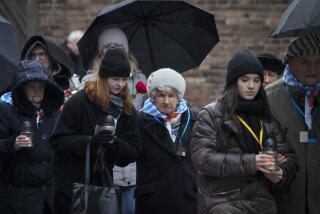Germans Alone Bear Blame for War: Kohl : But Bonn Officials Differ on How to Reconcile With Poland; E. Berlin Rejects Reuniting Nation
BONN — West German officials Friday marked the 50th anniversary of the start of World War II by acknowledging that Germans bear full responsibility for the cataclysm that cost more than 50 million lives.
At the same time, an East German official praised the Soviet Union for resisting Nazi dictator Adolf Hitler during the war and warned the Bonn government not to attempt to reunite the nation, which was partitioned in the war’s aftermath.
West German leaders paid particular tribute to Poland, Nazi Germany’s first victim of the war, but appeared to differ over how to reconcile the two countries. Germany’s invasion of Poland on Sept. 1, 1939, began World War II.
Speaking at a special nationally televised session of the Parliament, West German Chancellor Helmut Kohl declared that “Hitler wanted, planned and unleashed the war, (which) reached a dimension of horror that had never been seen before and must never be seen again.”
Seated in the audience were the Polish ambassador to West Germany and a group of Polish young people.
Kohl called for reconciliation between West Germans and Poles. He said: “Terrible things were done to the Polish people in the name of Germany and by German hands. The wounds the Second World War opened have not healed even today.”
But differences in how to go about healing those wounds surfaced in Friday’s speech-making by other West German leaders.
Boundary Disagreement
The opposition Social Democrats called on the government to reassure the Poles that West Germany has no claims on prewar territory that was given to Poland after the war.
Right-wing members of Kohl’s governing coalition, among them Finance Minister Theo Waigel, have insisted that until a permanent peace treaty is signed, Germany’s legal boundaries are those of 1937. This area includes much of what is now western Poland.
In his speech, Kohl skirted the issue by supporting the 1970 Warsaw Treaty that recognizes the postwar boundaries. But he did not specifically reject all claims to prewar German territory.
Former Chancellor Willy Brandt criticized the government on the Polish issue by accusing right-wing officials of interfering with anniversary trips that Kohl and President Richard von Weizsaecker had planned to take this summer.
The trips were not made, partly because Bonn and Warsaw could not agree on the amount and specifics of an economic support package for Poland.
Brandt, a former leader of the Social Democratic Party, who spent the war in exile in Sweden, said: “Unfortunately, the fatal impression arose this summer that the road to Warsaw was shorter from London, Paris and even Washington than from Bonn.” This was a reference to Polish visits by British Prime Minister Margaret Thatcher, French President Francois Mitterrand and President Bush.
In his speech, Kohl took note of the debt to Jews who perished in the Holocaust. He said West Germany’s improved relations with Israel and with Jews around the world indicate that “bridges can be built over an abyss.”
“Most countries of Europe suffered heavily at Germany’s hand,” Kohl said. “Many of them are now our partners, even our friends.”
In a remark apparently addressed to the political far right, Kohl, who was 9 years old when the war began, paid tribute to Germans who fought in the war.
“Most of them,” he said, “were honestly convinced that they were serving their country loyally. There were countless examples of bravery and humanity that deserve respect.”
Refugee Crisis
He did not mention the current crisis over East Germans trying to emigrate to the West. But in East Berlin, Foreign Minister Oskar Fischer told the East German Parliament that the Bonn government “must take leave of its baseless presumption of the right to represent all Germans and to exercise guardianship over them.
“It must give up all claims on foreign territory,” he said, “and end irresponsible talk about re-establishing the German empire within the 1937 borders.”
Fischer said World War II could have been avoided if the Western nations had overcome their fear of communism and allied themselves earlier with the Soviet Union.
East German leader Erich Honecker, 77, who is said to be recuperating from gallstone surgery, did not attend the meeting.
Also on Friday, Polish-born Pope John Paul II addressed his countrymen via television from the Vatican. Poles who gathered in Warsaw’s Victory Square saw the pontiff’s image on a large screen as he deplored the “long and painful period of suffering of humanity” during World War II and urged all peoples to “eliminate war from all parts of the world,” wire reports said.
Jewish leaders boycotted the Warsaw ceremony to protest the presence of a Roman Catholic convent at the site of the Auschwitz concentration camp, where millions of Jews and others were killed by the Nazis.
More to Read
Sign up for Essential California
The most important California stories and recommendations in your inbox every morning.
You may occasionally receive promotional content from the Los Angeles Times.









